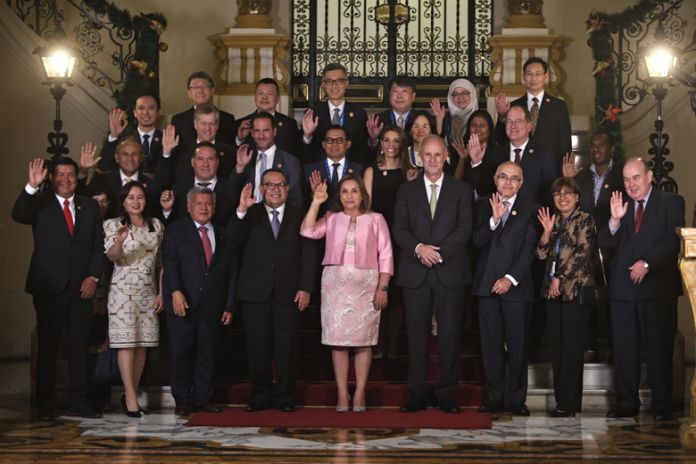LIMA, Peru – Facing unprecedented global challenges that have widened inequality and threatened recovery around the region, APEC senior officials gathered in Lima this week to set their priorities for 2024 aimed at developing more balanced, sustainable and inclusive growth in the Asia-Pacific.
The meeting took place just two weeks after APEC economic leaders met in San Francisco, United States, where they committed to bringing resiliency, sustainability, interconnection, innovation and inclusion to the region, as well as working together to respond to the most pressing economic challenges.
Peru will chair APEC for the third time in 2024, hosting more than 160 meetings across five cities including Arequipa, Cusco, Trujillo, Pucallpa and Lima.
Also watch: President Dina Boluarte of Peru Welcomes Officials, Ministers and Leaders to APEC 2024
A symposium on Peru’s proposed priorities and policy focus for next year was held on Monday, bringing together more than 200 stakeholders from the public, private and academia, as well as civil society, international organizations, media and APEC officials.
“We present these priorities not only to the senior officials of the 21 APEC economies, but also to Peruvian society as APEC Peru 2024 could not be successful without the participation of all of our stakeholders to help us achieve the goals stated in the APEC Putrajaya Vision 2040 and its plan of action,” said Ambassador Carlos Vasquez, the 2024 chair of APEC senior officials’ meeting.
Ambassador Vasquez announced Peru’s proposal for the overarching theme for APEC 2024 as “Empower. Include. Grow.,” and it covers three priorities:
- Trade and investment for inclusive and interconnected growth;
- Innovation and digitalization to promote transition to the formal and global economy;
- Sustainable growth for resilient development.
“On trade and investment, our intention is to renew the vision of the Free Trade Area of Asia-Pacific or FTAAP to consider issues such as inclusion, resilience, connectivity and sustainability along with traditional trade issues, as well as strengthening of the rules-based multilateral trading system,” ambassador Vasquez added.
Another key focus for the Peru host year will be inclusive growth and how to dive deeper into the informal economy, as well as how member economies can further support the transition to formal economy.
“For the first time in APEC, we will introduce the issue of empowering informal economic actors, especially through innovation and digitalization, as well as enabling the transition to formal economy,” ambassador Vasquez said.
According to the APEC Policy Support Unit, informality exists everywhere, but its impacts and contributions vary across the Asia-Pacific region. Estimates of informal output across APEC economies range from 8.2 percent of GDP in the United States to 56.6 percent of GDP in the case of Peru.
“And on sustainable development, we will deepen the work on food security to establish principles to prevent and revert food loss and waste, as well as the use of clean and renewable energy sources to achieve economic growth with less carbon emissions,” added ambassador Vasquez.
In his opening remarks at the Informal Senior Officials’ Meeting plenary on Wednesday, ambassador Vasquez reminded member economies that the world is changing and there is an urgent need for APEC to continue delivering outcomes based on its pillars and its long-standing commitment to making international cooperation a concrete tool to achieve growth.
“In today’s world, prosperity is no longer based on the mere accumulation of material wealth, but on resiliency, inclusion and sustainability,” Ambassador Vasquez continued. “This stresses the importance of human capital as the main asset for economies to grow and develop, we need a people-centered approach to development.”
“We know from data and research that many people including women and groups with untapped potential are involved in the informal sector,” said Dr Rebecca Sta Maria, executive director of the APEC Secretariat. “It is crucial for APEC to work on practical measures to include more people into the economy and global value chains, including to facilitate the transition of the informal to formal economy.”
“Our host year will build consensus, ensure continuity and relevance to the APEC economic cooperation agenda, during what continues to be a challenging and uncertain international environment,” ambassador Vasquez concluded.
Senior officials will meet in the capital city of Lima, Peru in February 2024.





